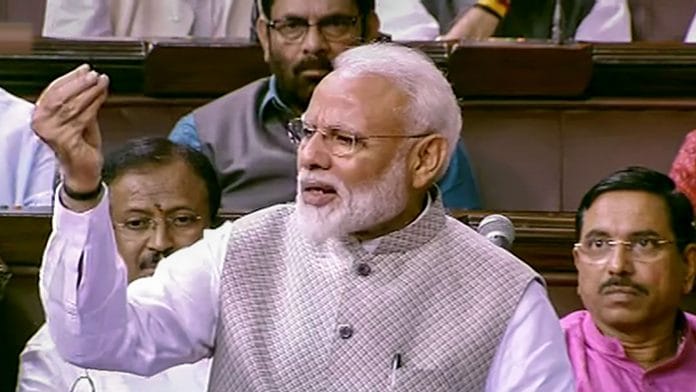Mumbai: India’s plan to sell its first foreign sovereign bonds is facing opposition from a key ally of Prime Minister Narendra Modi, and raising worries among investors and ex-central bankers.
Authorities are pushing ahead with the move to raise as much as $10 billion from overseas capital markets, a proposal first flagged by Finance Minister Nirmala Sitharaman in her debut budget this month. The government wants to diversify its borrowing, which has so far been limited to the domestic market, and create a benchmark for future bond sales. With global interest rates low and falling, officials see the timing as favorable too.
But voices opposed to the plan are getting louder. A key nationalist ally of Modi’s ruling Bharatiya Janata Party has called the proposal a “dangerous idea,” which could lead India into a debt trap. And ex-central bank governors like Raghuram Rajan say India’s weak public finances and struggling banks should give the government reason to pause.
“The slightest mismanagement of this route in future will expose the country to needless risks that it has hitherto been insulated from,” said Manish Singhai, chief investment officer at Tokio Marine Asset Management in Singapore, adding the country was seeking “short-term gratification” in its decision to tap global markets.
India runs a current-account deficit, which makes it reliant on foreign inflows and vulnerable to swings in investor sentiment and the currency. Borrowing from overseas will not only increase the risk of currency volatility, but also boost debt costs on dollar bonds when the rupee weakens.
‘Huge inflation’
Ashwani Mahajan, co-convenor of the Swadeshi Jagran Manch, an economic policy group linked with the ruling BJP, said foreign debt would open India up to inflation threats too.
“It’s not correct to say these bonds are providing us cheap loans. We are ignoring the currency risk in this,” he said by phone from New Delhi. “It may cause huge inflation in the country. If you start borrowing from abroad more currency will need to be printed. So it’s a dangerous idea.”
The group is consulting with economists and will raise its concerns directly with Modi, he said.
The government points to India’s low external debt — which at about 20% of GDP is below most emerging-market peers — as providing room to borrow internationally.
The government is under pressure to borrow more to fund spending pledges, and is already planning to sell a record 7.1 trillion rupees ($103 billion) of debt in the local bond market in the current fiscal year through March. It’s targeting a budget deficit of 3.3% of gross domestic product this year, but total public sector borrowing, which includes those by regional governments and state-owned companies, is estimated at more than 8% of GDP.
Potential investors are looking for fiscal restraint from the government, and see an international bond as instilling discipline on finances.
“We really want to select credits where we know they will be conservative when they come to the market, disciplined in terms of size and pricing of the transaction, and that there are good checks and balances locally, whether through the budget process or through parliament, which really ensures that the use of proceeds is very tight,” said Lupin Rahman, head of emerging-market sovereign credit at Pacific Investment Management Co. in London.
Default swaps
Analysts point to potential risks in India that have caused problems for some highly indebted countries in the past. In Argentina, sovereign bond yields and credit default swaps — insurance against non-payment — surged in 2010 after the central bank governor quit over pressure to transfer capital reserves to the government.
In the same year, Greece was plunged into economic crisis after irregularities in accounting procedures meant the government had under-reported its fiscal deficit numbers.
In India, the government too is seeking a greater share of the central bank’s reserves, while the nation’s economic data has come under question amid accusations of political interference.
“Global markets and investors can be pretty unforgiving,” said Amartya Lahiri, head of the Center for Advanced Financial Research and Learning, a Mumbai-based think-tank. “An overseas borrowing program will likely bring about greater market discipline on public finances.”
Also read: India could raise $10 billion in first foreign bond sale







Allah be praised. For once, one agrees with the SJM …
Mob justice for swadeshi jagran manch and communist party India. Kashmiri stone pelters should target these organisations.